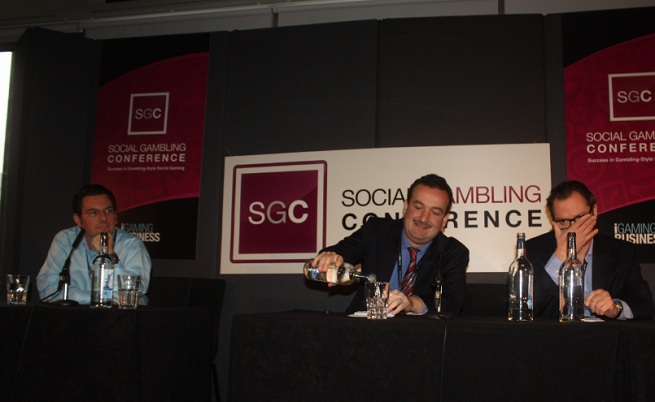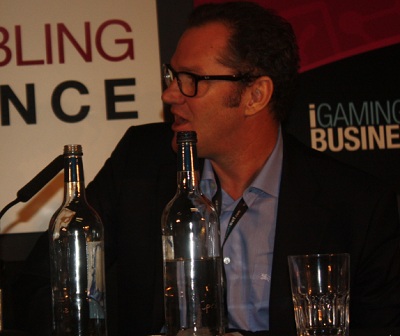 Real-money online-gambling companies have to abide by strict regulations that stop them from milking every last penny from gambling addicts who can’t afford to pay. But makers of social casino games (such as Zynga Poker on Facebook) are under no such restrictions. Should they be?
Real-money online-gambling companies have to abide by strict regulations that stop them from milking every last penny from gambling addicts who can’t afford to pay. But makers of social casino games (such as Zynga Poker on Facebook) are under no such restrictions. Should they be?
That was one of the topics debated at the Social Gambling Conference in London on Friday. The discussion put the real-money online-gambling companies at odds with the makers of non-gambling social casino titles, where users pay for virtual goods (such as poker chips) but are not allowed to cash out their winnings.
The panel, moderated by Stuart Tilly, director of a new group dubbed the Social Gaming Association, produced some fireworks at the first-time summit in London on Friday. Tilly’s group is a new association representing the non-gambling social-casino-game companies.
Jez San, president and founder of real-money gambling firm PKR, said he does not believe that gambling regulators should force social-casino-game enterprises to comply with responsible-gaming regulations.
AI Weekly
The must-read newsletter for AI and Big Data industry written by Khari Johnson, Kyle Wiggers, and Seth Colaner.
Included with VentureBeat Insider and VentureBeat VIP memberships.
But San (pictured above in blue on the far left), who spent two decades in the non-gambling video-game business and participated in the real-money gambling industry for the last six years, said that the social-casino-game industry should voluntarily submit itself to its own self-regulation.
“I don’t believe social games should be regulated. But I do believe the providers of the social games should take a more responsible attitude than they are currently taking,” San said.
 He said the most important thing is that the social-gaming outfits should allow individuals to impose their own limitations on how much money they can spend in a month. The people behind real-money online gambling experiences must currently do so in order to show they are taking responsibility for the possibility that addicted players might overspend.
He said the most important thing is that the social-gaming outfits should allow individuals to impose their own limitations on how much money they can spend in a month. The people behind real-money online gambling experiences must currently do so in order to show they are taking responsibility for the possibility that addicted players might overspend.
San said that he doesn’t want to see a newspaper like the (tabloid) Daily Mail write a profile of a single mother who lost all of her money playing casino-like social pastimes on Facebook. If the industry doesn’t impose its own regulations, it will inevitably face more strict government regulation in the future. If social-game companies (such as Zynga) do not self-regulate, they could make the whole industry look bad when the inevitable addiction problems surface.
“We don’t want to be profiled as having ruined someone’s life or bankrupted a single mother who can’t pay the bills,” San said. “We act in a very responsible manner. We don’t allow minors to play, and we don’t allow the vulnerable to play. The social gaming world doesn’t acknowledge such problems and would like to put its head in the sand and pretend that it’s a free world and people can spend whatever they want.”
Andrew Hughes (pictured left), chief executive of social-casino-title firm AbZorba Games, was on the other side of the discourse.
“There is a lot of debate still to be had,” he said. “I don’t think regulation should happen now. It’s too confusing … First, it is entertainment. You do not have to play. About 98 percent of my gamers never pay a single cent. They can earn chips looking at advertisements. Nobody can take the monetary value out of our game.”
Consumers can self-regulate now, and Hughes said voluntary self-regulation is fine. So in that sense, he agreed with San. But he would not grant that the social-game companies try to get people addicted. He noted that, among paying players of social casino titles, only 7 percent of them ever buy anything.
San said that average revenue per paying person is misleading, given that a small amount of gamers account for a large amount of sales. Hughes returned to the fact that it is clear in his releases that the play is just for fun.
San added, many of the social-game firms will not impose limits because “their job is to find whales” (people who spend a lot of money on social casino efforts, sort of like high rollers in Las Vegas) and then get them addicted.
“Can we keep it to social gaming,” Hughes asked. “We are not talking about social gambling. Social gaming is about a free experience.”